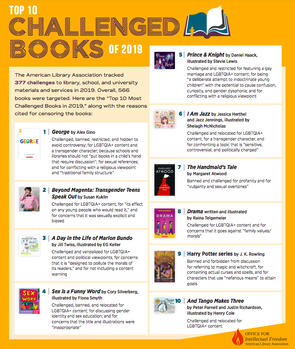Leopard's Tale |
|
|
Leopard's Tale |
|
|
 Across this week the AISL Secondary Library has joined with many libraries around the world in celebrating Banned Books Week, an annual event designed to celebrate the freedom to read. All middle school students and many upper secondary students have explored activities in the library around this theme. It is also a week that draws attention to banned and challenged books. The intellectual freedom that is a hallmark of our school and others like it is something we often take for granted. Banned Book Week, begun in 1982, grew out of a landmark US Supreme Court case called Island Trees School District vs. Pico. Steve Pico was only a high school senior when members of the parent community of his high school in Long Island, New York, sought to ban nine books from the school library. Steve Pico joined with four other high school students to protest the ban on the grounds that it was a violation of First Amendment rights. The students received help for legal fees from the American Library Association and other civil rights organizations. After a five-year process, the US Supreme Court decided that the right to read is implied by the First Amendment of the US Constitution and that school officials (in this case, school board members), did not have the right to restrict students' access to books simply on the grounds that they did not agree with the books' content. At AISL, we subscribe to the spirit of the American Library Association's School Library Bill of Rights & its Freedom to Read statement. Our library staff chooses books using the best selection tools available (such as School Library Journal, awards lists, and other publications) with a view to subject matters and themes that will resonate with our readers. We also select books for their ability to enrich & support our curriculum (see our Selection Policy for more information on this). We believe that books serve as both windows and mirrors*: windows that give us insights into other ways of life and a diverse range of experiences, which is a valuable way to develop empathy. Books also serve as mirrors: the reader can find aspects of his or her own life reflected in that story and as a result, feel less alone or feel validated. We strive to develop a collection that is diverse, engaging, and relevant to our students. As we develop our collection, we remain mindful of our international context. Every family has its own set of values and its unique cultural background that enriches our school. What may be a perfectly acceptable book for the child of one family to read may be deemed inappropriate by the family of another child due to differing values and cultures. Parents are always the final arbiters of what their child(ren) may or may not read, though that does not mean limiting the range of choice available to other patrons. Our library staff makes every effort to help students select books they will enjoy that are appropriate for that child’s grade level and interests, but conversations within the student’s family always matter most. Additionally, we strive to uphold the following Principles of Intellectual Freedom: 1. Parents have a right to determine what their own child may read or not read. They do not have a right to determine what other people’s children may read or not read. 2. Library / media specialists should protect the rights of all students to read a wide variety of books across various genres, resist self-censorship (selecting or omitting materials based on one's personal preferences or projected concerns about others’ reactions to a given work), and support teachers who face challenges. 3. Students should be trusted to choose books they want to read and taught that they are responsible for their own selections. When necessary, they should answer to their parents regarding those choices. (Note: given that our primary and secondary collections are housed in the same building, we DO steer students toward the appropriate "zone" for their particular grade level, and in secondary we have different areas for middle school and high school books). If you are interested in learning more about this year's Top 10 Challenged Books, here is a short video (2:36 minutes long) called The Top 10 Challenged Books of 2019 (made by The American Library Association & Office for Intellectual Freedom). Keep on reading! *Adapted from Emily Style's 1988 report "Curriculum as Window & Mirror" Comments are closed.
|
Vertical Divider
The Leopard's Tale is our main medium to keep our families informed on such things as the day to day happenings on campus, after school activities, summaries of any arts and sports events, helpful resources, and important dates and reminders.
Upcoming Events |
|
|